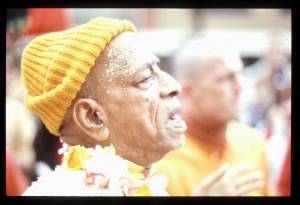CC Adi 17.168 (1975)

A.C. Bhaktivedanta Swami Prabhupada
Below is the 1996 edition text, ready to be substituted with the 1975 one using the compile form.
TEXT 168
- śuni’ stabdha haila kājī, nāhi sphure vāṇī
- vicāriyā kahe kājī parābhava māni’
SYNONYMS
śuni’—by hearing; stabdha—stunned; haila—became; kājī—the Kazi; nāhi—does not; sphure—utter; vāṇī—words; vicāriyā—after due consideration; kahe—said; kājī—the Kazi; parābhava—defeat; māni’—accepting.
TRANSLATION
After hearing these statements by Śrī Caitanya Mahāprabhu, the Kazi, his arguments stunned, could not put forward any more words. Thus, after due consideration, the Kazi accepted defeat and spoke as follows.
PURPORT
In our practical preaching work we meet many Christians who talk about statements of the Bible. When we question whether God is limited or unlimited, Christian priests say that God is unlimited. But when we question why the unlimited God should have only one son and not unlimited sons, they are unable to answer. Similarly, from a scientific point of view, the answers of the Old Testament, New Testament and Koran to many questions have changed. But a śāstra cannot change at a person’s whim. All śāstras must be free from the four defects of human nature. The statements of śāstras must be correct for all time.